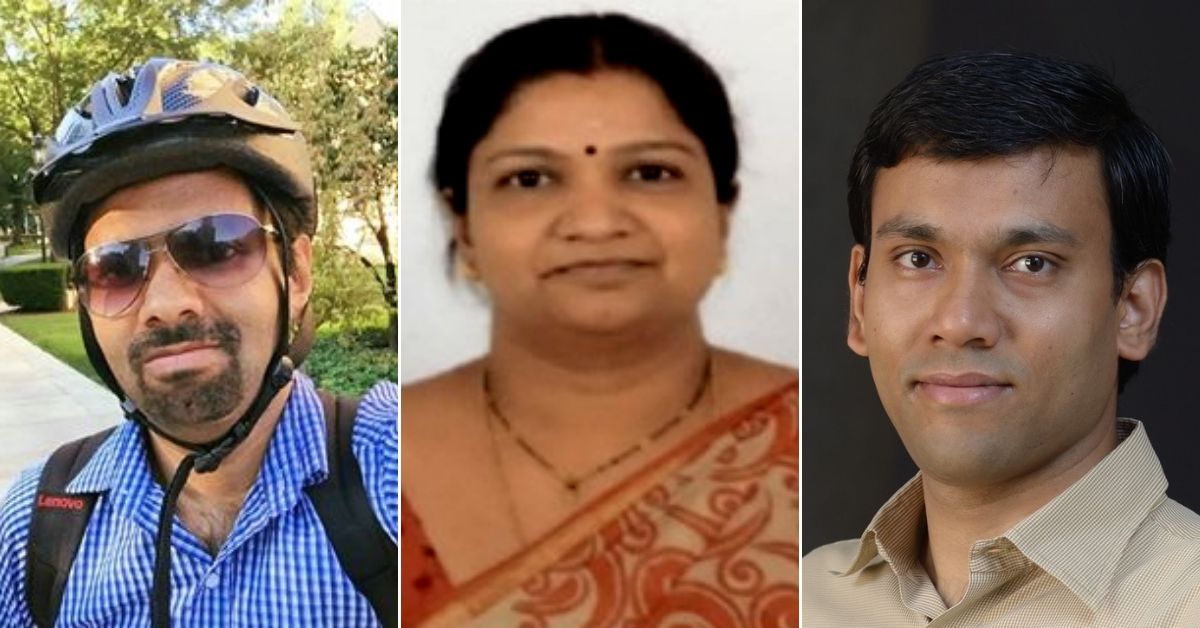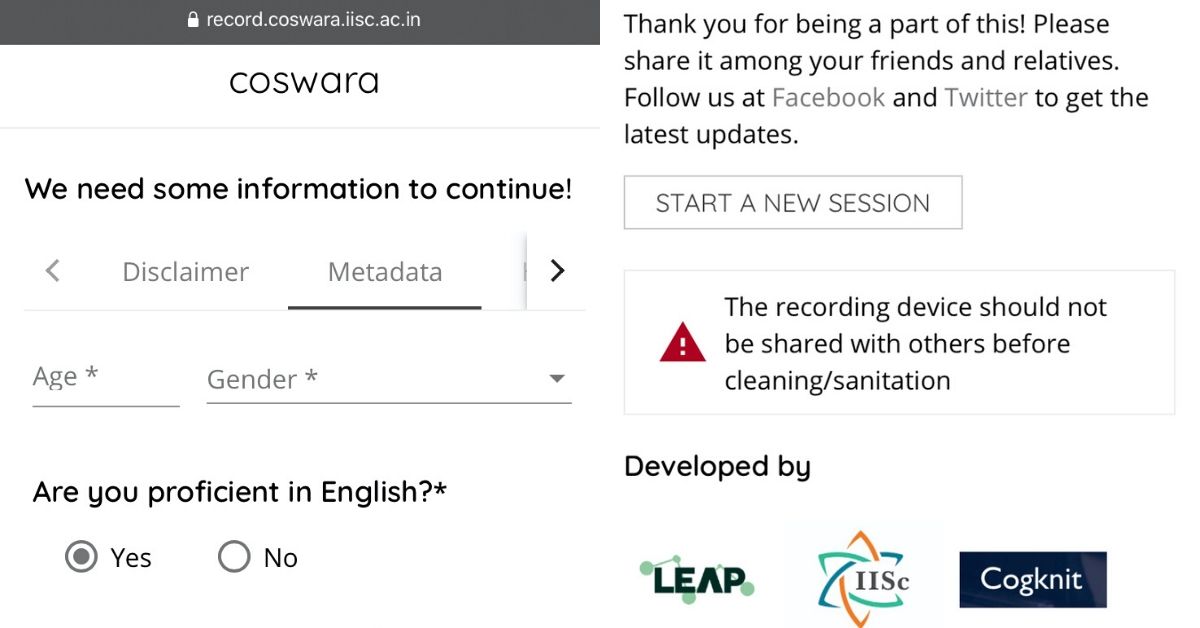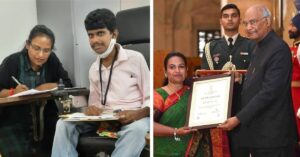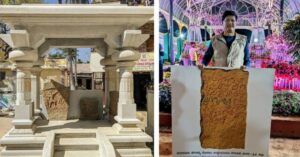Working From Home, IISc Scientists Design COVID-19 Test That Pre-Screens by Voice
Here's your chance to help the scientists. All you need is a smartphone, an inbuilt microphone and 5 minutes of your time! #COVID19

Currently, India’s COVID-19 testing capacity for testing is 15,000 per day. In a country where the number of positive cases is rising by 1000+ daily, this is clearly insufficient.
Which is why, the Indian Council of Medical Research (ICMR) and other similar authorities are trying to increase our capacity multifold, hoping to take it to 1 lakh tests daily.
Perhaps pre-screening the public before they go for tests could be a good measure to reduce the load on our healthcare professionals and resources.
Keeping this outlook in mind, scientists of the Indian Institute of Science (IISc), Bengaluru are currently developing one such pre-screening test that can mark one’s chance of being COVID-19 positive based on their speech and cough sound.
Coswara: Bengaluru scientists’ COVID-19 tool

Dr Sriram Ganapathy, an assistant professor at the IISc, is heading the team developing the test, which has been named Coswara—a portmanteau of COVID-19 and Swara, the Sanskrit word for sound.
“This tool will be a webpage or an app that takes sound data like breathing sounds, cough sounds and speech sounds and gives you a predictive number of chances of being COVID-19 positive. It is being developed on the hypothesis that the infection has acoustic biomarkers and the tool, by identifying these patterns can pre-screen individuals,” shares the speech recognition and deep learning expert with The Better India (TBI).
The 11 member team started working on this project in the last week of March when the home quarantine pushed them to test their expertise in developing a tool that may aid in the diagnosis of COVID-19. While a medical doctor from the IISc health center is part of the team, there are no virologists or microbiologists in it.
Two major symptoms of the highly contagious disease are dry cough and shortness of breath—both of which affect the way you speak, cough and breathe. Coswara banks on these symptoms and explores the distinguishing patterns of these stimuli to diagnose COVID-19.
“A good analogy would be a doctor using a stethoscope to hear the sounds in your chest and understanding the possibility of a disease or illness,” Dr Ganapathy shares.
He adds that Coswara uses simple speech recordings like saying “aaah” for an extended period or counting numbers for the diagnosis. If successful, it can be a widely used, low cost, and easy test to pre-screen the virus, while avoiding contact with healthcare workers.
Where the test stands and the road ahead:

The IISc scientists have the prototype of the test ready and are now pooling data resources to test it to check its accuracy. Interestingly, the team is working on this project pro-bono and expects no financial gains whatsoever.
“We are all working from our respective homes, and I just go to the IISc facility once in a while for technical work,” Sriram shares with TBI.
Coswara will record your voice, and much like sound tests for the diagnosis of tuberculosis or pneumonia will detect the chances of you being COVID-19 positive.
“When the tool is fully functional, the participant provides some basic information about their current health conditions, and then records breathing sounds, cough sounds and speech sounds through the webpage.
The result of our tool would be a predictive number which provides a probability that the patient is infected with Covid-19. For example, if the user sees a score of 80%, then they must be proactive and perform chemical testing. If a user is coming back to the tool and recording multiple times during the same day, the tool will also indicate how fast the symptoms are progressing,” Dr Ganapathy tells TBI.
He further uses the analogy of a face recognition tool common in smartphones. Just like the AI is trained to mark a bounding box over the face in the photo, Coswara will be trained to identify sounds that indicate symptoms of COVID-19 and those that don’t.
But to ensure the results are accurate, the IISc team needs to record and pool data from at least a couple thousand subjects—people like you and me who can lend their voice to this innovation.
An earnest appeal by the IISc scientists:

The Coswara team currently has 700+ participants ready to lend their voice for the tests. But they need many more to understand the accuracy of the test better.
“We need at least a couple of thousand participants—both healthy individuals and COVID-19 patients—to test Coswara. Rest assured that no personal data will be recorded for during the test. All we need is the sound of your speech, breathing and coughing. You open the web page and answer basic questions pertaining to your health—like a history of asthma or tuberculosis and geographical location. Following this, Coswara will ask you to perform some non-stressful sound exercises. You record and submit this, and that’s that. The entire routine takes about five minutes and is entirely contactless and free of cost,” mentions Dr Ganapathy.
He further states that the worst-case scenario is the one in which the hypothesis will be proven false. But that will still take research ahead, and the audio data can be used for medical research like a remote diagnosis of other respiratory diseases.
But if there’s even some partial success, it will indicate strong pre-screening practices that will help reduce the load of testing centres.
“We require healthy people, individuals with a history of respiratory diseases as well as COVID-19 positive patients to complete this study. I encourage you to help us out in the research, and share this information among your contacts.” the IISc professor requests.
If you are happy to help them out or have more questions, head on here: https://coswara.iisc.ac.in. You can also get in touch with Dr Ganapathy on his email ID: [email protected].
Also Read: Running Out of Medicines? City-Wise Helplines for Lockdown Emergencies
(Edited by Gayatri Mishra)
Like this story? Or have something to share? Write to us: [email protected], or connect with us on Facebook and Twitter.
This story made me
- 97
- 121
- 89
- 167
Tell Us More
We bring stories straight from the heart of India, to inspire millions and create a wave of impact. Our positive movement is growing bigger everyday, and we would love for you to join it.
Please contribute whatever you can, every little penny helps our team in bringing you more stories that support dreams and spread hope.



















